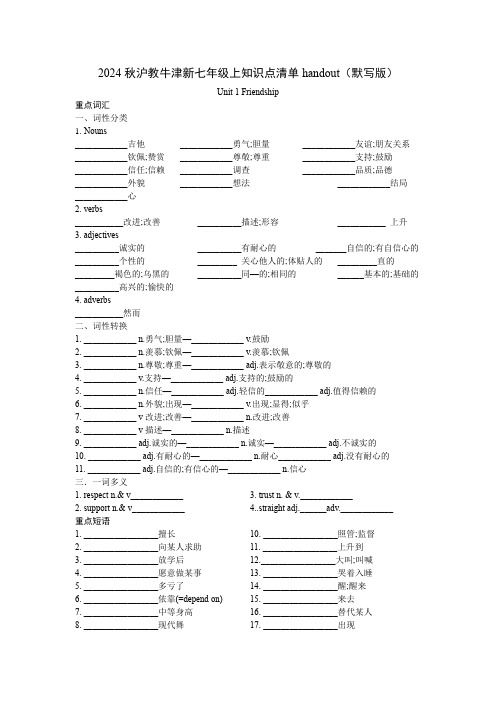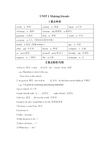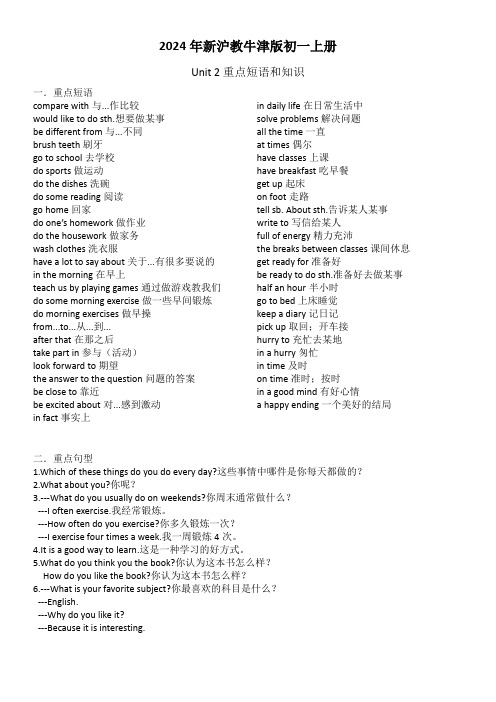最新沪教版七年级英语上册知识点
2024秋沪教牛津新七年级英语上册知识点清单(背诵版)

2024秋沪教牛津新七年级上知识点清单handout(背诵版)Unit 1 Friendship重点词汇一、词性分类1.Nounsguitar吉他courage勇气;胆量friendship友谊;朋友关系admiration钦佩;赞赏respect尊敬;尊重support支持;鼓励trust信任;信赖survey调查quality品质;品德appearance外貌thought想法end 结局heart心2. verbsimprove改进;改善describe描述;形容rise 上升3. adjectiveshonest诚实的patient有耐心的confident自信的;有自信心的personal个性的caring 关心他人的;体贴人的straight直的dark褐色的;乌黑的same同—的;相同的basic基本的;基础的glad高兴的;愉快的4. adverbshowever然而二、词性转换1. courage n.勇气;胆量—encourage v.鼓励2. admiration n.羡慕;钦佩—admire v.羡慕;钦佩3. respect n.尊敬;尊重—respectful adj.表示敬意的;尊敬的4. support v.支持—supportive adj.支持的;鼓励的5. trust n.信任—trustful adj.轻信的trustworthy adj.值得信赖的6. appearance n.外貌;出现—appear v.出现;显得;似乎7. improve v改进;改善—improvement n.改进;改善8. describe v描述—description n.描述9. honest adj.诚实的—honesty n.诚实—dishonest adj.不诚实的10. patient adj.有耐心的—patience n.耐心impatient adj.没有耐心的11. confident adj.自信的;有信心的—confidence n.信心三.一词多义1. respect n.& v尊敬;尊重 3. trust n. & v.信任;信赖2. support n.& v支持;鼓励 4..straight adj.直的adv.笔直地;径直重点短语1. be good at擅长10. watch over照管;监督2. turn to sb. for help向某人求助11. rise into 上升到3. after school放学后12.cry out大叫;叫喊4. be willing to do 愿意做某事13. cry oneself to sleep哭着入睡5. thanks to多亏了14. wake up醒;醒来6. count on依靠(=depend on)15. come and go来去7. medium height中等身高16. take somebody's place替代某人8. modern dance现代舞17. come along 出现9. take care of照顾(= look after / care for)核心句式1. What do you like doing?你喜欢做什么?2.Li Hua is helpful and patient.李华乐于助人且有耐心。
七上英语沪教牛津新版词汇表

/bi ɡʊd æt/
/tɜrn tə ˈsʌmbədi fɔːr hɛlp/
/ˈɑːftər skuːl/
/bi ˈwɪlɪŋ tə du ˈsʌmθɪŋ/
/θæŋks tə/ /kaʊnt ɒn/ /ˈmiːdiəm haɪt/
/ˈmɒdərn dæns/ /teɪk keər əv/ /wɒtʃ ˈoʊvər/ /raɪz ˈɪntuː/ /kraɪ aʊt/
/bɜːn/ /ɔɪl/ /ɡæs/ /ˈhɑːmfəl/ /ˈwɛbˌsaɪt/ /əʊn/ /ˈempərə(r)/ /hʌnt/ /wɔː(r)/ /ˈsændˌstɔːm/ /səˈluːʃn/ /bləʊ/ /ˌdʒenəˈreɪʃn/ /ˈsəʊlə ˈsɪstəm/ /fækt faɪl/ /biː ˈkʌvəd baɪ/ /æz fɑː æz wiː nəʊ/ /siː ˈlɛvəl/ /wɒts mɔː/ /prəˈvaɪd wɪð/ /ˈplæstɪk pəˈluːʃn/ /kʌt daʊn/ /ˈhʌndrədz əv/ /bləʊ əˈweɪ/ /ˈspeɪssuːt/ /kəˈlekt/ /liːv/ /ˈkɪləmiːtə(r)/ /wiːk/ /taɪ/
Unit 4-16 Unit 4-17 Unit 4-18 Unit 4-19 Unit 4-20 Unit 4-21 Unit 4-22 Unit 4-23 Unit 4-24 Unit 4-25 Unit 4-26 Unit 4-27 Unit 4-28 Unit 4-29 Unit 4-30 Unit 4-31 Unit 4-32 Unit 4-33 Unit 4-34 Unit 4-35 Unit 4-36 Unit 4-37 Unit 4-38 Unit 4-39 Unit 4-40 Unit 4-41 Unit 4-42 Unit 4-43 Unit 4-44 Unit 4-45 Unit 4-46 Unit 4-47 Unit 4-48 Unit 4-49 Unit 5-1 Unit 5-2 Unit 5-3 Unit 5-4 Unit 5-5 Unit 5-6
沪教版初中英语七年级上册知识点

Unit 1知识梳理Unit 2知识梳理Unit 3知识梳理重点词组1.on Earth 在地球上2.stop doing 停止做某事3.provide...with... 为……提供……4.put...into... 把……倒入……5.throw away 扔掉6.lift...up 将……抬起7.keep...alive 让……活着重点句型:1.there be (is/are)….2. some are…and some are….3. it is + adj + for sb + to do …4. make/keep + adj可数vs 不可数名词可数名词:集体名词如:people,单复数同形名词如:sheep、fish、deer等常考不可数名词:music, news, paper, advice, information, weather可数、不可数名词的数量修饰:some, many / much, a lot of, a few / little , few / little 等There be 句型There is + 单数可数名词/不可数名词There are + 复数可数名词“就近原则”原则:动词be的形式要和最靠近它的主语在数上保持一致;另外,还必须注意不可数名词用作主语时,动词be应用单数形式。
例:There is a book and some pens on the desk拓展:there be(某地有某物)与have/has(某人有…) 的用法区别“There be…”句式和have均可表示“有”的意思,但用法有别。
“There be…”表示“在某处有……”,意为“存在有”;而have却表示“某人/某物有……”,意为“某人/某物拥有……”。
Unit 4知识梳理Unit 5知识梳理Unit 6知识梳理。
最新最全沪教版七年级英语上册第一学期全册单词朗读知识点考点可编辑

沪教版七年级英语上全册单词朗读知识点单词German adj. ['dʒɜːmən] 德国的,德国人的,德语blog n. [blɒɡ] 博客grammar n. ['græmɚ] 语法sound n. [saʊnd] 听起来、声音complete v. [kəm'pliːt] 完成hobby n. ['hɒbɪ] 爱好country n. ['kʌntrɪ] 国家、乡下age n. [eɪdʒ] 年龄dream v. [driːm] 梦想,做梦everyone pron ['evrɪwʌn] 每个人Germany n. ['dʒɜːmənɪ] 德国mountain n. ['maʊntɪn] 山脉elder adj. ['eldə] 年龄较大的,年长的friendly adj.V ['fren(d)lɪ] 友好的engineer n. [endʒɪ'nɪə] 工程师world n. [wɜːld] 世界Japan n. [dʒə'pæn] 日本flat adj. [flæt] 平房,平坦的yourself pron [jɔː'self] 你自己US n. 美国close to(在空间,时间上)接近go to school去上学(be) good at擅长make friends with与……交朋友all over遍及'd like to = would like to愿意Unit1课文ReadingAnna’s blogHello everyone. Welcome to my blog.About meMy name is Anna. I’m from Germany. I’m 11 years old. I’m tall and thin.I have long hair. I live with my family in a house close to some mountains. My mum is an Art teacher. My dad is a doctor. I have an elder sister and an elder brother.About my school and my hobbiesEvery day, I go to school by school bus. My favourite subjects are Maths, Art and Science. I like my school because the teachers are all very friendly. My dream is to be an engineer.I like many sports. I’m good at swimming and playing basketball. These are my favourite hobbies.I want to make friends with young people from all over the world! Email me, please!安娜的博客大家好。
2024秋沪教牛津新七年级上册知识点清单(默写版)

2024秋沪教牛津新七年级上知识点清单handout(默写版)Unit 1 Friendship重点词汇一、词性分类1.Nouns____________吉他____________勇气;胆量____________友谊;朋友关系____________钦佩;赞赏____________尊敬;尊重____________支持;鼓励____________信任;信赖____________调查____________品质;品德____________外貌____________想法____________结局____________心2. verbs___________改进;改善__________描述;形容___________ 上升3. adjectives__________诚实的__________有耐心的_______自信的;有自信心的__________个性的_________ 关心他人的;体贴人的_________直的_________褐色的;乌黑的__________同—的;相同的______基本的;基础的__________高兴的;愉快的4. adverbs___________然而二、词性转换1. ____________ n.勇气;胆量—____________ v.鼓励2. ____________ n.羡慕;钦佩—____________ v.羡慕;钦佩3. ____________ n.尊敬;尊重—____________ adj.表示敬意的;尊敬的4. ____________ v.支持—____________ adj.支持的;鼓励的5. ____________ n.信任—____________ adj.轻信的____________ adj.值得信赖的6. ____________ n.外貌;出现—____________ v.出现;显得;似乎7. ____________ v改进;改善—____________ n.改进;改善8. ____________ v描述—____________ n.描述9. ____________ adj.诚实的—____________ n.诚实—____________ adj.不诚实的10. ____________ adj.有耐心的—____________ n.耐心____________ adj.没有耐心的11. ____________ adj.自信的;有信心的—____________ n.信心三.一词多义1. respect n.& v____________ 3. trust n. & v.____________2. support n.& v____________ 4..straight adj.______adv.____________重点短语1. _________________擅长10. _________________照管;监督2. _________________向某人求助11. _________________上升到3. _________________放学后12._________________大叫;叫喊4. _________________愿意做某事13. _________________哭着入睡5. _________________多亏了14. _________________醒;醒来6. _________________依靠(=depend on)15. _________________来去7. _________________中等身高16. _________________替代某人8. _________________现代舞17. _________________出现9. _________________照顾(= look after / care for)核心句式1.你喜欢做什么?___________________________________________________________ 2.李华乐于助人且有耐心。
最新七年级英语上册知识点(上海教育出版社版本)

七年级英语上册知识点(上海教育出版社版本)七年级英语上册(上海教育出版社版本)Unit 1 Making friends词组listen to music 听音乐 play basketball 打篮球 read books 读书be from=come from 来自… live in 住在… live with 跟…一起住close to 接近 go to school 上学 be good at +v-ing 擅长make friends with 交朋友 all over the world 全世界be far away from 离…很远 want to 想要 would like to 愿意draw pictures=paint pictures 画画 pay attention to 注意 start with 以…开始take a bath 洗澡 on the Internet 上网 lots of 很多in free times 在空闲的时间 best wishes 最美好的祝福句型What does...mean?—It means... …是什么意思?——它的意思是…How do you go to school? ——I go to school by bus/car /on foot.你怎么去上学的?——我坐公交车/汽车 /步行上学My dream is to be a/an+职业 =I want to be a/an+职业我的梦想是成为…What’s your favourite subject?=What subjects do you like best? 你最喜欢哪一科?What does your father/mother do?=What is your father/mother? 你爸妈做什么工作?Unit 2 Daily life词组junior high school 初级中学 on foot 步行 take part in=join in 参加have a good time=enjoy oneself 过得愉快 go to bed/sleep 睡觉talk about 谈论 brush teeth 刷牙 watch TV 看电视ride a bicycle/bike 骑单车 play the piano 弹钢琴 wash clothes 洗衣服in the morning 在早上 have break 休息 from...to...从…到…at night=in the evening 在晚上 at school 在学校 get up 起床senior high school 高级中学 have breakfast/lunch/supper/dinner 吃早/午/晚/正餐keep a dairy 写日记 think of 考虑 do morning exercises 做早操句型How+形容词+主语+be动词!多么…!例:How short it is!When the bell rings, ... 铃声响起的时候……Is your school close to your home? ——Yes,it is./No,it isn’t.When dose the school day usually begin/start/end? ——At+时间Unit 3 The Earth词组be covered by 被…覆盖 provide...with...为…提供…put...into... 把…倒入… throw away 扔掉 on Earth 在地球上a lot of 很多... stop doing 停止正在做的事情stop to do 停止(手上做的接着去)做某事 save water 节约用水in the future 将来 in the air 在空中 lift up 升高句型There is+单数可数名词/不可数名词有……There are+可数名词复数有……It is + adj + (for sb) to do sth (对某人来说)做某事很…Unit 4 Seasons词组take a trip 去旅行 make snowmen/a snowman 堆雪人go on /have a picnic 野餐 fly kites 放风筝 go swimming 去游泳in + 季节/月份(spring/summer/March/July)at the time of 在…的这个时候 send out 发出have a lot of fun 玩得很开心 get + adj.(warm/hot/cold) 逐渐变…start to = begin to 开始…句型It is interesting/exciting to do sth. 做某事很有趣/兴奋It spends some time dong/to do sth. 做某事花费某时间—What’s the weather like in + 某地 + today? 某地今天天气如何?—It’s hot, but it will be rainy a few days later. 很热,不过过几天会下雨。
最新沪教版七年级英语上册知识点

III详细讲解1.Read a German girl’s blog。
(1)German :① adj.德国的(德国人的,德语的)This is a German car。
② n.德国人,是可数名词。
复数形式要在后面加“s”。
德语,是不可数名词。
e.g.: Germans speak German。
◎中国China,中国人/中文Chinese;日本Japan,日本人/日语Japanese;法国France,法国人/法语French;英国England/Britain/U.K. 英国人/英语English(2)girl’s是名词“girl”的所有格形式,意为“女孩的···”所有格:在名词后加上“’s”构成所有格,表示一种所属关系,表示“···的”它的构成有以下方式:①一般情况下在名词词尾加“’s” e.g.: Tom’s books 汤姆的书②以-s结尾的复数名词的所有格,一般在其后面直接加“’”即可。
e.g.: parents’ names 父母的名字;Teachers’ Day 教师节③表示两人或多人各自的所属关系,要在各个词尾分别加“’s”;表示两人或多人共同的所属关系,只需要在最后一个词的词尾加“’s”。
e.g.: Lily’s and Linda’s bikes。
丽丽和琳达的自行车.(注意:两人各有一辆车)Lily and Linda’s room。
丽丽和琳达的房间。
(注意:两人共住一间房)④表示某人的家、店铺、办公室时,常省略“’s”后面的名词house,shop,office 等。
At my uncle’s = at my uncle’s home 在我叔叔家2.I’m from Germany. =I come from Germany.come from =be from 来自 e.g.: I’m from China.3.I have an elder sister and an elder brother.①Elder :形容词,“年长的”。
2024年沪教牛津版七年级英语上册 Unit2重点短语句型和知识

2024年新沪教牛津版初一上册Unit 2重点短语和知识一.重点短语compare with与...作比较would like to do sth.想要做某事be different from与...不同brush teeth刷牙go to school去学校do sports做运动do the dishes洗碗do some reading阅读go home回家do one’s homework做作业do the housework做家务wash clothes洗衣服have a lot to say about关于...有很多要说的in the morning在早上teach us by playing games通过做游戏教我们do some morning exercise做一些早间锻炼do morning exercises做早操from...to...从...到...after that在那之后take part in参与(活动)look forward to期望the answer to the question问题的答案be close to靠近be excited about对...感到激动in fact事实上in daily life在日常生活中solve problems解决问题all the time一直at times偶尔have classes上课have breakfast吃早餐get up起床on foot走路tell sb. About sth.告诉某人某事write to写信给某人full of energy精力充沛the breaks between classes课间休息get ready for准备好be ready to do sth.准备好去做某事half an hour半小时go to bed上床睡觉keep a diary记日记pick up取回;开车接hurry to充忙去某地in a hurry匆忙in time及时on time准时;按时in a good mind有好心情a happy ending一个美好的结局二.重点句型1.Which of these things do you do every day?这些事情中哪件是你每天都做的?2.What about you?你呢?3.---What do you usually do on weekends?你周末通常做什么?---I often exercise.我经常锻炼。
- 1、下载文档前请自行甄别文档内容的完整性,平台不提供额外的编辑、内容补充、找答案等附加服务。
- 2、"仅部分预览"的文档,不可在线预览部分如存在完整性等问题,可反馈申请退款(可完整预览的文档不适用该条件!)。
- 3、如文档侵犯您的权益,请联系客服反馈,我们会尽快为您处理(人工客服工作时间:9:00-18:30)。
III详细讲解1.Read a German girl’s blog。
(1)German :① adj.德国的(德国人的,德语的)This is a German car。
② n.德国人,是可数名词。
复数形式要在后面加“s”。
德语,是不可数名词。
e.g.: Germans speak German。
◎中国China,中国人/中文Chinese;日本Japan,日本人/日语Japanese;法国France,法国人/法语French;英国England/Britain/U.K. 英国人/英语English(2)girl’s是名词“girl”的所有格形式,意为“女孩的···”所有格:在名词后加上“’s”构成所有格,表示一种所属关系,表示“···的”它的构成有以下方式:①一般情况下在名词词尾加“’s” e.g.: Tom’s books 汤姆的书②以-s结尾的复数名词的所有格,一般在其后面直接加“’”即可。
e.g.: parents’ names 父母的名字;Teachers’ Day 教师节③表示两人或多人各自的所属关系,要在各个词尾分别加“’s”;表示两人或多人共同的所属关系,只需要在最后一个词的词尾加“’s”。
e.g.: Lily’s and Linda’s bikes。
丽丽和琳达的自行车.(注意:两人各有一辆车)Lily and Linda’s room。
丽丽和琳达的房间。
(注意:两人共住一间房)④表示某人的家、店铺、办公室时,常省略“’s”后面的名词house,shop,office 等。
At my uncle’s = at my uncle’s home 在我叔叔家2.I’m from Germany. =I come from Germany.come from =be from 来自 e.g.: I’m from China.3.I have an elder sister and an elder brother.①Elder :形容词,“年长的”。
与“younger”相对。
主要用于表示家庭成员之间的长幼关系。
不能用于“than”前面。
elder brother 哥哥younger brother 弟弟elder sister 姐姐younger sister 妹妹②Older:泛指新旧、老幼或年龄大小的关系。
可以用于“than”前面。
My elder brother is one year older than I. 我哥哥比我大一岁。
4.Every day,I go to school by school bus.①go to school是一个固定搭配,不要在“ school”前加“the”。
因为它并不指具体的某所学校。
所在在前面不要加任何冠词。
Go to bed 睡觉;go to hospital去医院;at home 在家注意:play basketball/football(球类),不用加“the”。
Play the piano/violin(乐器),要加“the”。
②by school bus “乘坐校车”:by +交通工具乘坐····by bike 骑自行车by taxi 坐出租车by car 乘小汽车5.I like my school because the teachers are all very friendly.①because “因为”,引导原因状语从句,语气很强烈。
可以用来回答“why”引导的特殊疑问句。
②friendly 形容词,友好的。
(注意:虽然以-ly结尾,但不是副词,而是形容词)类似的词有:lovely(可爱的)lonely(孤独的)lively (生动的)daily(每日的)ugly(丑的)silly (傻的)6.My dream is to be an engineer .我的梦想是成为一名工程师。
①一般来说,is后面都不加“to”,但这里“to be an engineer”做表语。
这样结构的例子有:my job/work/task is to feed animals.② dream: n.梦想可数名词。
V.做梦dream of /about (doing) sth.7.I like many sports.many :许多。
修饰可数名词复数。
Many people 许多人Much:许多。
修饰不可数名词much water/time 许多水/手机a lot of既可以修饰可数名词又可以修饰不可数名词。
8.About yourself.Yourself是反身代词,“你自己”。
第一人称:单数myself——复数ourselves第二人称:单数yourself——复数yourselves第三人称:单数himself/herself/itself——复数:themselves9.What does your father/mother do?你父亲/母亲是做什么工作的?What does/do +某人+do?询问某人现在从事何种职业或做什么工作。
其他句型还有:①what +be+某人?(一般不用于第二人称)如:what’s your brother ?——he’s a waiter.②what is sb’s job?如:what’s your father job?——he is a worker.③what do/does +某人+want to be?如:what do you want to be?——I want to be a teacher.10.I’d like to be your e-friend.我想成为你的网友。
I’d like =I would like 想要用法:①would like +名词如:I’d like an apple.②would like +to do sth注意:①would like 没有人称和数的变化。
②would like 构成的一般疑问句中,表示“一些”和“某物”时,要用“some”和“so m ething”,而不用“any”和“anything”。
③由“would like ”引导的疑问句的回答方式。
Would you like some bread.——Yes,please./No, thanks.Would you like to join us.——Yes,I’d love /like to.或者,but···(委婉)11.best wishes 最美好的祝愿。
(注意wish要加es)IV语法一、特殊疑问句:以疑问代词what, who, whom, whose, which或疑问副词when, where, why, how等放在句首提问的句子,叫特殊疑问句。
答句必须针对问句中的疑问词来回答。
(一)各种疑问词的用法:1.what用于对句子的主语、宾语、表语提问。
用于提问“事情、东西”,还可以提问“姓名、职业、时间”等。
如:what’s your name?2.who, whom, whose只能指人,who“谁”,常作主语,whom“谁”,常作宾语,whose“谁的”,常作定语或表语。
Who taught you English last year? 去年哪个老师教你们英语?Whose father works in Beijing? 谁的爸爸在北京工作?3.which用来询问人或物,一般有特定的选择范围。
Which is your sister of the two girls?那两个女孩中,哪个是你姐姐?(限定在这两个女孩中)4.when, where, why, how分别对时间、地点、原因和方式When did you arrive here? 你什么时候到这里的? (对时间)Where were you last night? 你昨晚在哪里?(对地点)Why were you late again? 你怎么又迟到了?(对原因)How do you go to school? 你怎样上学的?——by school bus(对方式)注意:①when与what time的区别:when指的是大体的时间,而what time询问的是具体的时间。
--What time shall we meet? -- At ten o’clock.--When shall we meet? --Tomorrow.②how many用于询问“多少”,且后面接可数名词复数。
——提问数量how much用于提问“多少”,后面接不可数名词,也可对“钱”提问。
——提问不可数名词的数量和价格。
③how old用于提问年龄“多大岁数”;对应名词“age”.how long用于提问时间或长度“多长时间,长度多长”,回答用“for+一段时间”;how soon用于提问时间“还要多久”,回答用“in+一段时间”;how far提问距离“有多远”;how often用于提问频率“多长时间一次”;How tall提问高度:How tall are you? = What is your height?(对应height)(二)句型结构:1.如疑问词作主语或主语的定语,即对主语或主语的定语提问,其语序是陈述句的语序:疑问词(+主语)+谓语动词+其他成分。
如:Who is there?谁在那儿?Which book is his?哪本书是他的?2.如疑问词作其他成分,即对其他成分提问,其语序是:疑问词+一般疑问句语序?(1)疑问词+be+主语+其他?如:who is your teacher?(2)疑问词+助动词+主语+行为动词(其他)?如:What does your father do?Why do you like English。
(三)回答:不能用yes / no,即问什么答什么,尤其是简略回答。
如:-How old is your sister? 你妹妹今年多大了?-She’s only five. / Only five. (她)才5岁。
(四)对划线部分提问规则:第一步,找准特殊疑问词。
第二步,提前或加助动词:(be动词am is are was were,情态动词can could may must will would shall should,助动词(完成时中)have has had.)第三步,作变化抄剩余词。
(主语时态的变化,如I变You ;前边加does do,后边动词用原形.)对划线提问)例如:1. They went to work yesterday morning.A:找准疑问词:WhenB:加助动词:(过去时)didC:作变化(将went 变为go)并抄剩余词:they go to work.即:When did they go to work?2 . Her mother goes to school by bike.A:找准特殊疑问词:HowB:加助动词(三单时):doesC:作变化(goes—go) 抄剩余词:her mother go to school即:How does her mother go to school?二、不定冠词的用法不定冠词有a 和an两个,泛指“一”的概念,但并不强调数量,只表示名词为不特定者,且仅用在单数可数名词前。
